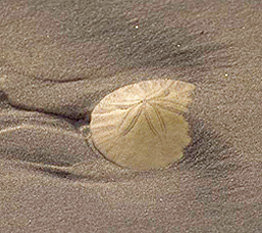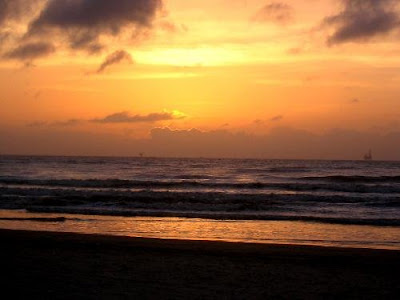 My child was four the first time she saw the ocean.
My child was four the first time she saw the ocean.
We had driven down to Houston for a meeting of the regional Gay Academic Union, of which I had just been appointed coordinator despite my extreme youth of 19 years. I was engaged in a battle at my conservative state university (North Texas State University) to have its newly formed (by me) Denton Gay Alliance recognized as a student organization. The ACLU and other groups were assisting our case, and I had suddenly become out and a leader. I hadn't wanted either, and was under horrific stress.
It was 1974. Patty Hearst was newly kidnapped. Watergate hearings were under way. I was the comother of a four-year-old who had spent the past two days either cooped up in a car or at the periphery of long, agitated meetings. She was a child given to daydreaming and imaginary games, an early reader, extremely bright and good-natured, but she had been ignored for too long. When we finally peeled away from dinner in Houston and began driving to Galveston, she moved to the front seat, to my lap, twitchy with wanting to finally set eyes on the ocean. My partner remarked that Libby was a Pisces, it was in her nature to long for water. I wasn't sure, given the dark, Libby would be able to see it until we were right on it, but I could feel her overflowing impatience in her body and kept quiet about my doubts.
We were traveling with two other women we didn't know well. They talked us into renting a suite at the Hotel Galvez for the night, right on the water, instead of a budget motel. It was the off season, that may have helped us decide we could afford it. At any rate, once we reached Seawall Boulevard, there was the ocean alongside us. My daughter, Libby, began shrieking and could not honestly be quieted. (Hotel Galvez, Galveston, from a breakwater)
(Hotel Galvez, Galveston, from a breakwater)
We had bought her a plastic bucket and shovel in Houston. When we climbed out of our car at the hotel, she reached into the back, grabbed her bucket, and took off at a dead run, toward the wall which separated her from the beach. There was at least a ten foot drop, so I dashed after her. My partner, her mother, told the other two to check us in and followed.
I persuaded Libby to walk around instead of vaulting the wall by grabbing her hand and running at her pace. She had on blue overalls decorated with big flowers and a yellow T-shirt -- funny how clearly I can remember that. She stopped briefly to ditch her sneakers, which I had to run back and grab, then catch up with her again. She ran directly toward the waves, stopping only when the water reached her bare feet. She let out one scream of joy after another.
She looked down and saw a broken sand dollar in the millimeter of surf. "Can I touch it?" she asked me.
"You can pick it up. Any shell you want on this beach, you can have" we told her. She took off jogging again, her eyes trained on the sand. Every single scrap of a shell was picked up by her short fingers and dropped into her bucket. Within ten minutes, it was full to the brim. We were laughing, trailing along behind her: The quality of a shell didn't matter a whit to her, it was the "shellness" of it that mattered, its origin in the ocean. Her cheeks were bright red, her blondy/brown curls framing her exuberant face.
She ran back to me and emptied the bucket at my feet, commanding "Save those for me" and taking off to gather more. I had to sit down, I was laughing so hard. I noticed how the damp and cold immediately froze my ass, but I sat there and sorted through her haul, keeping all the shells which were not broken. I folded my shirt up to hold them and got to my feet to meet up with her and my partner again. They were far down the beach by this point.
With my partner's help, Libby calmed down enough to actually look at the shells she was snatching. We talked about function and the creatures who had lived in them, and she became more selective in her collection. After an hour, she had a second bucket full and her feet were blue chunks of ice. Her lips were chattering, but my partner had to pick her up and bodily remove her from the beach to get her back to our hotel room. Libby sobbed on her shoulder. We promised an early morning visit back to the sea as solace, and when we got to our room, we filled a tub with warm bubble bath and dumped in all her shells for her to play with. That stopped her weeping.
We put an armchair in front of the window piled with pillows and blankets, and she went to sleep there, watching Galveston beach. A beach that is no longer there.
I was born on the Gulf Coast and occasionally saw the ocean at a distance when we moved from one place to another, twice flying over it for long distances, but it was not until I was 12 that I actually put my body into the sea. This was at Praia Atalaia outside the small city of Aracaju, Brazil, where we went to live for a year. The South Atlantic there was beautiful in an unreal way, jeweled tones of every hue, and the sand like sugar. It was warm and shallow, and my initial fear of the waves -- which I tried to hide, shameful to be so afraid at 12 -- eventually gave way to a kind of delight that, had I been Libby at four, I could only have expressed with screaming.
A few days later, a huge storm hit the city. We were in a hotel, four of us in one room, no TV, every book read, and the boredom was intense. We knew not a soul in this city, spoke no Portugese, and even going out for a snack was problematic. But my father decided we should go to the beach during the afternoon drench, he had already been given a company jeep, and that road, at least, he had driven before. Somehow he talked my mother into it.
The jeep was a battered jungle green, with a canvas top and zip-down plastic windows that did not shut out all the rain. My little brother and I sat on a ridged metal seat across the back which amplified every bump in the road. Daddy had learned from someone on his new crew that windshield wipers in Brazil were called "pisca-piscas", an onomatopoeic term which made him and Mama laugh every time they said it. The pisca-piscas could not keep up with a tropical downpour. Daddy drove slowly. There were few people on the road, and no one at all on Praia Atalaia.
He drove out onto the sand, to the firm strand beyond the dunes, and parked to face the water. We sat as the sun set into the dunes behind us and the rain stopped, though it was still storming out at sea, we could tell. As it got dark, I became aware that something eerie was happening in the surf, in the rills along shore. Mama said "Look! Phosphorus!"
She explained about the tiny light-emitting organisms which filled the water in front of us, becoming agitated by motion enough to fire their bulbs. It was ghostly beautiful. Bill moved up to sit between them, straddling the gear shift. I leaned forward so my chin rested on Mama's shoulder. We were strangers in a strange land, but we were together.
Mama began talking about Columbus, Cortez, Pizarro. She told us how Europe looted the New World, loading their wooden ships so heavily that they sank in storms like this, over and over, but greed kept them trying to haul more away from our shores. She began describing life aboard ship, the endless creak of wood, the terrible living conditions below deck, the names of sails and rigging. Mama had never been aboard a sailing vessel in her life, but she was a voracious and retentive reader with a love of language, and she made it come to life for us.
She imagined out loud the terror of a storm at sea, being helpless at the mercy of wave and wind. I was staring through the front windshield into the distance over the depths, where clouds occasionally lit up with lightning. Suddenly, on the horizon, I saw a galleon, its canvas in tatters, one mast broken, headed for capsize on a sandbar or rocks. I cried out loud and jerked backward. I saw it, I know I did. Mama laughed with a thrill in her voice.
She began reciting one of the many poems her generation learned in school, back when children were encouraged to memorize. Daddy joined in on occasional lines. My spine was taut with tingles. When she was done, Daddy kissed her and started the jeep for us to head home.
On First Looking into Chapman's Homer
Much have I traveled in the realms of gold,
And many goodly states and kingdoms seen;
Round many western islands have I been
Which bards in fealty to Apollo hold.
Oft of one wide expanse had I been told
That deep-browed Homer ruled as his demesne;
Yet did I never breathe its pure serene
Till I heard Chapman speak out loud and bold:
Then felt I like some watcher of the skies
When a new planet swims into his ken;
Or like stout Cortez when with eagle eyes
He stared at the Pacific – and all his men
Looked at each other with a wild surmise–
Silent, upon a peak in Darien.
(John Keats, 1816) (Praia Atalaia, Aracaju, Brasil; photo by Paulo Favero)
(Praia Atalaia, Aracaju, Brasil; photo by Paulo Favero)
Sunday, September 21, 2008
SEABORN
Posted by
Maggie Jochild
at
3:14 PM
![]()
Labels: Aracaju, Denton Gay Alliance, family memoir, Galveston, Gay Academic Union, memoir, On First Looking Into Chapman's Homer, Praia Atalaia
Subscribe to:
Post Comments (Atom)





No comments:
Post a Comment